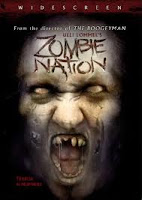Why Zombies? Why Now?
“The grief-stricken survivor at the end of the world
is not someone I identify with,
is not someone I identify with,
unless I go to Whole Foods or a party or something.”
 That’s Colson Whitehead in a recent Harper’s interview, talking about his forthcoming novel, Zone One, the most recent manifestation of our current Zombiegeist. Another day, another zombie. Obviously, human fascination with monsters and the undead in particular is an enormous topic, with a rich history, and I’m not pretending to engage that in any thorough way, here. I just have an intuition about our current zombiphilia. If it’s bullshit, or so obvious that it’s not worth saying, my bad.
That’s Colson Whitehead in a recent Harper’s interview, talking about his forthcoming novel, Zone One, the most recent manifestation of our current Zombiegeist. Another day, another zombie. Obviously, human fascination with monsters and the undead in particular is an enormous topic, with a rich history, and I’m not pretending to engage that in any thorough way, here. I just have an intuition about our current zombiphilia. If it’s bullshit, or so obvious that it’s not worth saying, my bad.
Basically, I think zombies today spark a horrible feeling of correspondence in many of us. We see mindless creatures of pure appetite, staggering through the apocalypse, and we recognize ourselves. We can’t turn away. And I think that this is a slightly different motivation than zombie audiences have had in recent history—at least, it’s a development of a particular strain of zombie rhetoric that’s worth noting. You see, ours are not evil zombies, not zombies called forth by some ancient spell (think H.P. Lovecraft, the book of Revelation, The Evil Dead, plus all manner of horror from Hellraiser to Amityville). For the most part, our zombies are not walking the earth because of some plotline that’s rooted in religion. More or less, our zombies are environmental—tree-hugger zombies, if you will. Our dead rise because of imbalances in our relationship with nature, usually leading to the development of some kind of super-virus that annihilates us but not before providing a short interval of zombie spectacle for our viewing pleasure.
These cautionary zombies come out of a Faustian tradition, where humanity is punished for its greed and hubris. For obvious reasons, contemporary audiences are particularly vulnerable to this kind of pathos. We turn out in glassy-eyed droves for movies that reveal how Mother Earth will bitch-slap us into oblivion. A quick glance at our end-of-summer blockbusters reveals the enduring power of this premise: see Contagion (bird flu), or Rise of the Planet of the Apes (super-cheesy research-science blunder leading to Ape, rather than Zombie, apocalypse). It’s in this vein that Colson Whitehead’s quip about Whole Foods is telling, even if it’s delivered with a wink. Whitehead’s zombies, called “skels” in Zone One, are created by a super-viral “plague” that brings humanity to its knees. In his Harper’s interview, Whitehead acknowledges that the book was driven more by his teenage passion for horror and sci-fi than any desire to be topical. He just wanted to have some fun, basically. So why the nudge at Whole Foods? Well… faced with the embarrassment of riches on display at a contemporary supermarket, a rational individual recognizes the unsustainability of our consumer practices. Grief-stricken, our Colson buys cod from the overfished Atlantic, a tomato farmed by slaves in Mexico and shipped a thousand miles in a fossil-fuel guzzler, and a nice bottle of Pinot Grigio. He wanders home for a light dinner and a movie. What’s in the queue? A classic zombie flick, of course, which will spark a sense of fellow-feeling in our Colson, as he watches the mindless creatures hungrily rip and devour flesh.
It’s worth noting that the slobbering flesh-eaters in the 1968 film, Night of the Living Dead, which contemporary artists often cite as a major zombie influence, were brought to life by nuclear radiation. And there’s a whole catalog of nuclear monster fear culture, which we’ve largely gotten over. Sure, TV shows and political candidates can still capitalize on our fear of the dirty bomb, but that’s a blip on the radar screen compared to the massive nuclear hysteria of the 1980s. So, take heart! Maybe our current zombie obsession isn’t really a symptom of any serious environmental crisis. Like a little case of hives, it’s a surface manifestation of a psychic trauma that will eventually pass, just like the nuclear fear, for the most part, passed. Twenty years from now, our zombies will be manifestations of some other cultural fear... I don't know... fear of gay marriage, say. And all our zombies will be gay, and married, and the family values types will say, "see--look what happens," until eventually we get past that fear, too.




Comments
Post a Comment